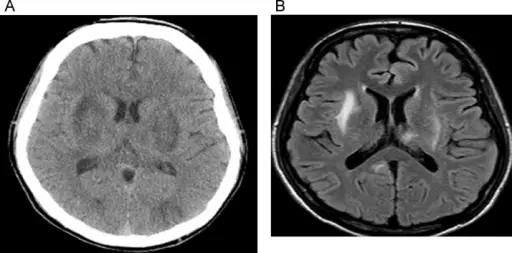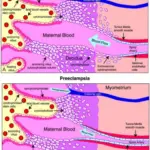Eclampsia is most commonly defined as the new onset of convulsions and/or coma during pregnancy or in the immediate postpartum period in the presence of preeclampsia.
What is the Pathology of Eclampsia?
The pathology of eclampsia is:
-Etiology: The cause of eclampsia is unknown.
-Genes involved: None.
-Pathogenesis: The sequence of events that lead to eclampsia includes acute hypertension leads to cytotoxic edema formation, regional hypoperfusion, and ischemic damage causing cerebral arteries to undergo vasospasm.
-Histology: The histology associated with eclampsia show placenta with villous ischemia (increased syncytial knots, thickening of trophoblastic basement membrane, villous hypervascularity, villous agglutination, and infarction), fibrinoid necrosis of uterine vessels and acute atherosis; more tortuous or densely distributed spiral and basal arteries than normal.
How does Eclampsia Present?
Patients with eclampsia typically affect females present at the age range of less than 20. The symptoms, features, and clinical findings associated with eclampsia include convulsions, seizures, changes in mental status, frontal and/or occipital headaches, nausea, and/or visual changes.
How is Eclampsia Diagnosed?
Eclampsia is diagnosed with high blood pressure in 3rd trimester.
How is Eclampsia Treated?
Eclampsia is treated by establishing a patent airway and ensuring maternal oxygenation, prophylaxis, and BP management by labetalol.
What is the Prognosis of Eclampsia?
The prognosis of eclampsia is good with full recovery in a few days or months.



